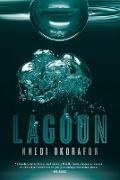Read more
Zusatztext " Lagoon is a fascinating entry into the science fiction of place." Informationen zum Autor Nnedi Okorafor is an award-winning novelist of African-based science fiction, fantasy, and magical realism. Born in the US to Nigerian immigrant parents, Okorafor is known for weaving African cultures into creative settings and memorable characters. Her book, Who Fears Death has been optioned by HBO, with Game of Thrones ' George R.R. Martin as executive producer. Okorafor is a full-time professor at the University at Buffalo, New York (SUNY). Klappentext "It's up to a famous rapper, a biologist, and a rogue soldier to handle humanity's first contact with an alien ambassador--and prevent mass extinction--in this novel that blends magical realism with high-stakes action. After word gets out on the Internet that aliens have landed in the waters outside of the world's fifth most populous city, chaos ensues. Soon the military, religious leaders, thieves, and crackpots are trying to control the message on YouTube and on the streets. Meanwhile, the earth's political superpowers are considering a preemptive nuclear launch to eradicate the intruders. All that stands between 17 million anarchic residents and death is an alien ambassador, a biologist, a rapper, a soldier, and a myth that may be the size of a giant spider, or a god revealed"--Lagoon CHAPTER 1 FIST It was an eerie moment as Adaora and the two strange men arrived at that spot, right before it happened. Exactly three yards from the water at exactly 11:55 p.m., 8 January 2010. Adaora came from the north side of the beach. The tall veiled man came from the east. The bloodied man wearing army fatigues from the west. They ambled in their general directions, eyeing each other as it became clear that their paths would intersect. Only Adaora hesitated. Then, like the others, she pressed on. She was a born-and-raised Lagosian, and she was wearing nicely fitted jeans and a sensible blouse. She’d spent more time walking this beach than probably both of these men combined. She wiped the tears from her cheeks and trained her eyes straight ahead. About a quarter of a mile away was open water where the Atlantic overflowed its banks. When bad things happened, her feet always brought her here, to Lagos’s Bar Beach. In many ways, Bar Beach was a perfect sample of Nigerian society. It was a place of mixing. The ocean mixed with the land, and the wealthy mixed with the poor. Bar Beach attracted drug dealers, squatters, various accents and languages, seagulls, garbage, biting flies, tourists, all kinds of religious zealots, hawkers, prostitutes, johns, water-loving children, and their careless parents. The beachside bars and small restaurants were the most popular hangout spots. Bar Beach’s waters were too wild for any serious swimming. Even the best swimmers risked a watery death by its many rip currents. Adaora had removed her sandals. It was deep night, and this was probably a bad idea. So far, however, she hadn’t stepped on any pieces of wood, rusty nails, broken glass, or sharp stones. Her need to feel the cool sand between her toes at this moment outweighed the risk. Despite its trash, there was still something sacred about Bar Beach. On 12 June 1993, the day of the most democratic election in Nigeria’s history, she’d come here with her father and watched him shed tears of joy. On 23 June, her mother brought her here because her father and uncles were at home cursing and shouting over the military annulling those same elections. She came here to escape the reality that her best friend was sleeping with her biology professor to earn a passing grade. On the day she received her PhD ...

